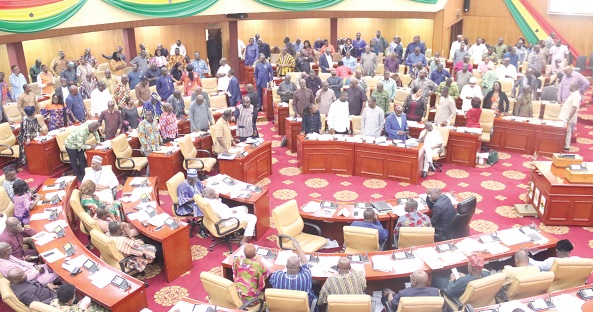
Are MPs serving interest of party, constituents or country?
The pivotal role of Parliament in a democracy is not in dispute.
In fact, Parliament is the heart of every democracy, hence the consolidation, deconsolidation, backsliding or reversal of a democracy can be linked to Parliament.
The story of Ghana’s place as a trailblazer in democratic governance in West Africa, if it still holds true, cannot be told without Parliament.
That is why we must all take a keen interest in what happens in Parliament.
Protector of masses
The Parliament of Ghana has acted as the representative and protector of the masses over the years by, among other things, providing a platform for debate and discussions on critical issues that affect the daily lives of people.
It has held governments since 1993 accountable by providing oversight and challenging its decisions; albeit minimally.
Our members of parliament (MPs) have shaped laws through amendments and passed many other laws for the successful functioning of our democracy.
As a mediator between the citizens and the government, Parliament is expected to work to maintain trust between the two.
However, our MPs have prioritised the interest of their political parties, perhaps more than any other thing, apart from their conditions of service.
Approval issues
The recent approval of ministerial nominees by Parliament has brought to the table a cocktail of issues.
While the ruling party caucus and supporters saw the approval as victory, the opposition caucus and supporters see it as a dent on good governance.
The sense or otherwise of the approval is subjectively based on one’s political lenses, which is good for the frontline political actors.
Prior to the Eighth Parliament, it was common to hear the assertion that ‘the minority has their say and the majority has their way’.
This worked well because of the numerical strength of the ruling party at any time. But the story is not the same today.
What appears to be strengthened is the political parties directing MPs to vote in a particular direction.
While the merit of some of such claims are valid, that is not the focus of this piece.
If we condone political parties directing MPs to vote on policy issues without allowing for independent minded position emanating from proper debate, consultations and discussions, it could potentially result in lack of transparency.
This makes it difficult for Parliament to hold the executive to account.
It may even lead to policies that are not in the best interest of constituents whose last bet is for their MPs to protect them from inimical policies that border on their survival instincts.
More importantly, this type of situation can lead to the erosion of democracy.
After all, what is the essence of democracy when public opinion and the will of the people are not taken into account when making decisions?
Political parties must, therefore, credit MPs with some wisdom to be able to act in the best interest of their constituents.
Yes, the calibre of MPs and their mind-set may make this task difficult without the parties intervening.
This notwithstanding, it is better to continue to nurture democratic consciousness in our society, particularly so that delegates of the political parties will use their primaries to elect candidates who will neither compromise on ideological orientation of their parties nor the national interest.
It is true that MPs are sponsored on the ticket of their respective political parties, and are expected to uphold the values, ideology and norms of the party.
Those who don’t like this, we are told, have the choice of going to Parliament as independent MPs. Sensible as this may sound, it poses a lot of challenge for our democracy.
One is that it weakens Parliament as an arm of government tasked with the responsibility of serving as a countervailing authority over the executive.
Weak parliament
A weak parliament can negate the dividends of a democracy, as it reduces the ability of constituents to be involved in the political process and have their views respected.
As a matter of common sense, without a strong parliamentary oversight, the executive is most likely to become unaccountable with its powers unchecked.
This can reduce the effectiveness of checks and balances, thereby making it easier for the executive to act without proper public consultation.
Besides, weak parliaments tend to be more susceptible to influence from outside forces, which can result in policies that are not in the public interest.
A report on the 2021 edition of the Kofi Annan Foundation Peace and Security Forum themed ‘Democracy and Governance in the Context of Complex Crises in West Africa’, authored by Prof. Emmanuel Gyimah-Boadi, notes that threats to democracy in Ghana, ‘which continues to earn a “free” ranking, was first bestowed in 2000.
It indicts Parliament for ratifying developmentally questionable international agreements submitted by the executive branch, often under “certificates of urgency”.
Our MPs, political parties and the executive arm of government must think of sustainable democracy by building and improving upon what was started by their predecessors.
We need a strong Parliament that can tame kleptocratic politicians and their cronies from syphoning state resources or reverse our democracy through the passage of restrictive voter registration laws.
The writer is a lecturer at the Department of Political Science Education
University of Education, Winneba
